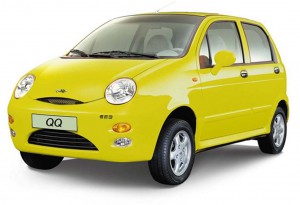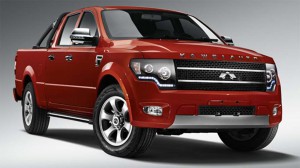It takes a sharp eye to spot the differences: the subtle curve of the rear spoiler, the more rounded front grille and the slight changes to the taillights. But as far as consumers are concerned, the thing that likely matters most is that the Jiangling Landwind X7 costs barely one third as much as the Range Rover Evoque.”
And that has Britain’s Jaguar-Land Rover seeing red as it faces yet another Chinese knock-off blatantly stealing some of its business. That has been a problem faced by a number of foreign automakers – from little Smart, which has seen a Chinese clone of its Smart Fortwo, up to Ford, which has had its F-Series pickup copied down to the tie-downs in its cargo bed.
JLR is aggressively pursuing a legal case, and it isn’t stopping at China’s borders, winning an injunction preventing the Chinese company from selling the X7 in Brazil, where Jiangling recently appointed an importer. But observers say the British firm could be in for a tough battle. A number of other makers have failed to get the courts to take action in similar lawsuits over the years.
General Motors, for example, won only a minor victory against a small Chinese firm that adopted the name Chery for its car brand and then started launching a virtual clone of Chevrolet’s Korean-made Matriz microcar as the Chery QQ. GM showed that even the doors of the two models were interchangeable. But Chery continued to market the QQ for less than half the price of the Matriz for several more years – outselling the Chevy model by over two-to-one.
The consolation prize was that the Chinese firm agreed not to use the Chery name in the U.S. where it easily could have been confused with Chevy.
(Chinese automaker GAC may be ready to enter US auto market. Click Here for the latest.)
Honda, meanwhile, spent a dozen years going after a Chinese company that cloned its best-selling SUV, the CR-V. It eventually did win compensation – 16 million yuan, or $2.43 million, compared to the 300 million yuan it was seeking.
Ford had no luck in blocking Kawei Auto, meanwhile, from duplicating the look of its last-generation F-150 pickup, down to the kink in it headlight assembly.
One thing the clones have in common is a relatively low cost, often coming in for a fraction of the price of the vehicles they copy. The Kawei K1 pickup started at $16,000, less than half the cost of a Ford F-150.
The knock-offs are more likely to share look-alike designs than their underlying engineering. The Chery QQ, for example, scored miserably in crash tests compared to the Chevy Matriz. Key safety features, such as electronic stability control, are more likely to be absent on the low-price copies, meanwhile.
But in a price-sensitive market like China, that often does not seem to matter with buyers – many shopping for their first car.
Privately, auto industry officials complain that the copycats are being protected by Beijing and local Chinese governments who want to see domestic makers gain ground against importers. And in many cases, regional governments, and even the Chinese military, have financial ties to those automakers. U.S., European and other Asian manufacturers have often looked away when faced with knock-offs to avoid creating problems for themselves in what has become the world’s largest auto market.
(GM posts strong sales rebound in China. Click Here for more.)
But JLR has decided to take action, and not just in China. Spokesman Stuart Schorr told TheDetroitBureau.com, “We are…confirming we have taken legal action,” though he declined to discuss specific details.
The timing of the lawsuit could be fortuitous. China has been coming under more aggressive fire for its tolerance of intellectual property theft in recent months, much of it targeting Alibaba, China’s answer to Amazon. After the online service joined the Washington-based Anti-Counterfeiting Coalition, it spurred a wave of defection, including Gucci which described Alibaba as a “dangerous and damaging adversary” for allegedly tolerating widespread sale of counterfeit designer goods.
Faced with a wholesale revolt – and the revelation of ties between the Coalition’s president and Alibaba, the Chinese firm was tossed out.
Asking not to be identified by name, a senior Detroit automotive executive told TheDetroitBureau.com, “We’ll be watching closely” the JLR – Jiangling case to see if China decides to do more than give lip service to copyright protection.
If JLR wins, Chen Jihong, a Beijing-based lawyer at Zhong Lun Law Firm, told the Reuters news service it could send a strong message about a shift to protect intellectual property rights.
(Ford wants to go green in China. Click Here to see what it’s planning.)




‘Land Wind’? Bwahahahaha! I hope that sounds better in Chinese…